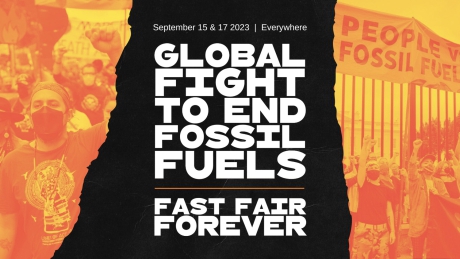Action Alert
You are here
Join the global march to end fossil fuels

September 12, 2023
The Canadian Interagency Forest Fire Centre (CIFFC), is a not-for-profit corporation coordinating resources, mutual aid and information sharing between federal, provincial and territorial wildland fire management agencies. For each of the 120 days from May 11th to September 7th, CIFFC characterized the severity of the wild fire crisis as "extreme" ("National Preparedness Level" 5) and the agencies stretched beyond their limits.
While the situation has improved slightly in the past few days, the severity is still "very high" and agencies remain swamped.
And the wildfire season is not yet over. It is already the worst wildfire season ever recorded in so-called Canada, with 17 million hectares of area burned as of September 9th, more than twice the previous record. This is almost the size of Uruguay.
These fires have emitted over 350 megatonnes of carbon dioxide and reduced the capacity of forests in the north of Turtle Island to absorb carbon. They are part of global wildfires across the globe - Hawaii, the U.S., Europe, Siberia and elsewhere.
But the devastation of the climate crisis is multidimensional. In one region, high temperatures and dry conditions lead to wildfires, heat domes and drought; in another, rapidly developing hurricane storm surges and atmospheric rivers cause massive flooding. Mediterranean storm Daniel has caused flooding in Europe and North Africa - at least 2,000 people have perished in Libya due to catastrophic flooding.
While many regions of the world, in particular the Global South, have been bearing the brunt of the climate crisis for many years, this year has brought home its immediacy to people in the countries af the northern hemisphere most responsible for the crisis.
Despite 3 decades of international meetings claiming to be working to reduce greenhouse gas emissions, the situation has continued to get worse. In fact, half the increase in CO2 since 1850 has happened since 1990. Here in Canada, oil production has almost tripled to 4.5 million barrels per day in the same period, much of the increase due to tar sands production. Since 80% of this oil is exported, the emissions don't show up officially in Canada's column. Weak market based incentives to move away from fossil fuels and continuing direct and indirect subsidies to big oil in the sham Trudeau climate plan spells disaster for people and the planet.
Fossil fuel corporations are some of the most profitable corporations on the planet, and they continue to wield enormous influence on government and industry. They have used this influence to undermine action to phase out the products they sell.
A new report from Oil Change International entitled "Planet Wreckers"shows how only 20 countries, led by the US and including Canada, are responsible for 90% of CO2 emissions from new oil and gas developments planned between now and 2050. Stopping these new projects is an imperative for the global movement for climate justice, a first step on the path to a transition away from reliance on fossil fuel energy.
On September 20th in New York City, UN Secretary-General António Guterres will be calling for world leaders at the UN Ambition Summit to make ambitious commitments to phase out fossil fuels. Activists in New York City will start the ball rolling by organizing a thousands strong March to End Fossil Fuels on September 17th.
This has become a global movement, with public meetings, cultural events, climate strikes, marches, rallies and other actions planned for September 15th - 17th in over 400 locations endorsed by over 780 organizations. There are events on every continent (except Antarctica). Please check out the map of global actions, including dozens across so-called Canada, here: https://fossilfueltreaty.good.do/global-march/map/
Across Canada actions are happening from St. John's NL to Port Alberni BC, from Toronto to Whitehorse YT. The breakdown for major cities is: Friday, Sept 15th in Vancouver, Halifax, Ottawa, Edmonton and Victoria; Saturday, Sept 16th In Moncton and Toronto; and Sunday, Sept 17th in Calgary and Hamilton.
Across Ontario, other actions include: Friday in Thunder Bay, Sudbury, Sarnia, Kingston, Lindsay and Huntsville; Sunday in Newmarket and Whitby.
Across BC, other actions include: Friday in Victoria, Salmon Arm, Penticton and Port Alberni; Sunday in Maple Ridge, Kelowna and Smithers (nearby Wet'suwet'en territory).
For years, September has been a month for global climate action, exemplified by the student climate strikes.
In September 2019, as many as 7.6 million people worldwide joined Fridays for Future led global climate strike actions across 150 countries on every continent (including Antarctica). In so-called Canada, over a million participated in actions, including 500,000 in Montreal, 100,000 in Vancouver and 80,000+ in Toronto - but many participated in smaller cities, towns and on Indigenous reserves and territories.
This groundswell of climate activism fed into the mobilizations led by Wet'suwet'en land defenders against the CGL fracked gas pipeline that #ShutDownCanada with Indigenous led rail, port and road blockades in February, 2020.
Despite the challenges of Covid-19, there were September climate strike actions in the 3 years since, and ongoing support for Indigenous sovereignty. This September join a resurgent movement for climate justice near you to build the forces from below that can challenge the priorities of those that profit from fossil fuel business as usual and imagine a different world that puts people and the planet before profit.
Section:









